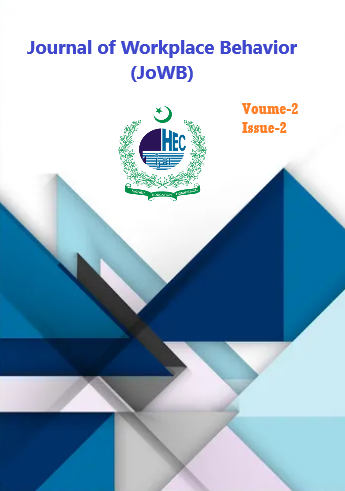The Benevolent Leadership and Employee Performance: The Role of Self-Efficacy and Autonomy in SMEs
Main Article Content
Abstract
This study intends to examine the impact of benevolent leadership on employees' task performance and contextual performance in Pakistan's Small and Medium Enterprises (SMEs). In doing so, the study illustrates the mediating role of self-efficacy and the moderating role of autonomy in the relationship of BL and employees' task and contextual performance. Data were collected from a sample of 309 respondents from SMEs and analyzed with the help of partial least squares (PLS) and the PROCESS macro techniques. The structural equation model (SEM) results show that self-efficacy mediates the relationship between BL and task and contextual performance in SMEs. The findings of this study also reveal that the impact of BL on task and contextual performance is stronger when employees enjoy a higher level of autonomy. The paper discusses implications for research and practice in the fields of leadership and human resource management (HRM).
Article Details
References
Alatf, A., & Anjum, H. (2018). Benevolent leadership, perceived supervisor support and
subordinate performance. Journal of Management and Human Resource (JMHR), 1, 1-17.
Andersen, J. A. (2016). An old man and the “sea of leadership”. Journal of Leadership Studies,
(4), 70-81.
Avey, J. B., Wernsing, T. S., & Palanski, M. E. (2012). Exploring the process of ethical
leadership: The mediating role of employee voice and psychological ownership. Journal of
Business Ethics, 107(1), 21-34.
Aycan, Z. (2006). Paternalism Indigenous and cultural psychology (pp. 445-466): Springer.
Bandura, A. (1991). Social cognitive theory of self-regulation. Organizational behavior and
human decision processes, 50(2), 248-287.
Baron, L., & Morin, L. (2010). The impact of executive coaching on self-efficacy related to
management soft-skills. Leadership & Organization Development Journal, 31(1), 18-38.
Blau, P. (1964). Power and exchange in social life. NY: John Wiley & Sons.
Blau, P. M., & Scott, W. R. (2003). Formal organizations: A comparative approach: Stanford
University Press.
Borman, W. C., & Motowidlo, S. M. (1993). Expanding the criterion domain to include
elements of contextual performance.
Brinberg, D., & Castell, P. (1982). A resource exchange theory approach to interpersonal
interactions: A test of Foa's theory. Journal of Personality and Social Psychology, 43(2),

